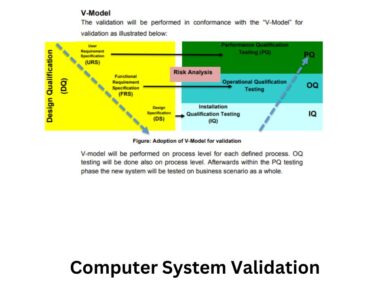Quantum Computers are the Future: Quantum computing is a rapidly evolving field that has the potential to revolutionize the way we process information. Unlike classical computers that use bits to represent information, quantum computers use quantum bits or qubits to store and process data.
Also Read
This allows quantum computers to perform certain calculations much faster than classical computers.

One of the main reasons why quantum computers are considered the future is because of their ability to solve complex problems that are beyond the reach of classical computers.
For example, quantum computers can be used to efficiently factor large numbers, which is a problem that is fundamental to modern cryptography. This means that quantum computers could potentially break many of the encryption schemes that are currently used to secure online transactions and communications.
Another area where quantum computers are expected to have a significant impact is in the field of drug discovery. Quantum computers can be used to simulate the behavior of molecules, which is a critical step in the drug discovery process.
By simulating the behavior of molecules, researchers can identify potential drug candidates much faster than with classical computers. This could lead to the development of new drugs that are more effective and have fewer side effects.
Quantum Computing Basics
Quantum computing is a type of computing that uses quantum mechanics to perform complex calculations. Unlike classical computers that use binary digits (bits) to represent information, quantum computers use quantum bits (qubits).
Qubits can exist in multiple states simultaneously, allowing quantum computers to perform many calculations at once.
One of the key principles of quantum mechanics is superposition. This means that a qubit can exist in multiple states at the same time. For example, a qubit can be both 0 and 1 at the same time.
This allows quantum computers to perform many calculations simultaneously, making them much faster than classical computers for certain types of calculations.
Another key principle of quantum mechanics is entanglement. This means that two qubits can become linked in such a way that the state of one qubit affects the state of the other qubit, even if they are separated by large distances.
This allows quantum computers to perform calculations that would be impossible for classical computers.
Quantum computers are still in the early stages of development, and there are many technical challenges that need to be overcome before they can be used for practical applications.
However, many experts believe that quantum computing has the potential to revolutionize fields such as cryptography, drug discovery, and materials science.
The Power of Quantum Computers

Quantum computers are considered the future of computing due to their immense power and potential to solve complex problems that classical computers cannot.
They are based on the principles of quantum mechanics, which allow them to perform certain calculations exponentially faster than classical computers.
One of the key advantages of quantum computers is their ability to perform parallel computations. While classical computers process information sequentially, quantum computers can process information simultaneously, allowing them to solve problems much faster.
This is due to the use of qubits, which can represent multiple states at the same time, unlike classical bits, which can only represent either 0 or 1.
Another advantage of quantum computers is their ability to perform certain calculations that are impossible for classical computers. For example, Shor’s algorithm, which is used to factor large numbers, can be performed exponentially faster on a quantum computer than on a classical computer.
This has significant implications for cryptography, as many encryption algorithms rely on the difficulty of factoring large numbers.
In addition to cryptography, quantum computers have the potential to revolutionize many fields, including drug discovery, materials science, and artificial intelligence.
For example, quantum computers can be used to simulate complex molecular interactions, allowing researchers to design more effective drugs. They can also be used to optimize complex systems, such as transportation networks or energy grids.
Overall, the power of quantum computers lies in their ability to perform parallel computations and solve problems that are impossible for classical computers.
While there are still many challenges to overcome before quantum computers become widely available, their potential for solving complex problems has made them a key area of research and development in the tech industry.
Quantum Supremacy
Quantum supremacy is a term used to describe the ability of a quantum computer to perform a calculation that would be practically impossible for a classical computer.
In 2019, Google claimed to have achieved quantum supremacy, which has been considered a significant milestone in the field of quantum computing.
The term “quantum supremacy” was coined by John Preskill in 2012 to describe the potential of quantum computers to solve problems that classical computers cannot.
In October 2019, Google announced that its quantum computer had performed a calculation in 200 seconds that would have taken the world’s most powerful supercomputer 10,000 years to complete.
This calculation demonstrated that quantum computers are capable of performing computations that are beyond the reach of classical computers.
The achievement of quantum supremacy has significant implications for the future of computing. It is expected to have a profound impact on various fields, such as cryptography, drug discovery, and artificial intelligence.
Quantum computers are expected to solve problems that are currently intractable, which could lead to significant advances in science and technology.
However, it is important to note that the achievement of quantum supremacy does not mean that quantum computers will replace classical computers entirely.
Quantum computers are still in the early stages of development, and there are still many challenges that need to be overcome before they can be widely adopted.
Classical computers will continue to play a crucial role in computing for the foreseeable future.
In conclusion, quantum supremacy is a significant milestone in the development of quantum computing. It has demonstrated the potential of quantum computers to solve problems that are beyond the reach of classical computers.
While there is still much work to be done before quantum computers can be widely adopted, the achievement of quantum supremacy has opened up new possibilities for scientific and technological advancement.
Challenges in Quantum Computing
Quantum computing is a promising field, but it is not without its challenges. Here are some of the main obstacles that researchers face in developing quantum computers.
Decoherence
One of the biggest challenges in quantum computing is the problem of decoherence. Quantum systems are highly sensitive to their environment, and any interaction with the outside world can cause the system to lose its quantum properties.
This process is known as decoherence, and it is a major obstacle to building large-scale quantum computers. Researchers are working on ways to mitigate decoherence, such as using error-correcting codes and building better isolation systems.
Scalability
Another challenge in quantum computing is scalability. While quantum computers have shown promise in solving certain problems, they are not yet capable of solving larger, more complex problems that classical computers can handle.
Building larger quantum computers is difficult due to the high level of precision required in constructing and controlling quantum systems. Researchers are working on ways to scale up quantum systems, such as developing new qubit designs and improving control systems.
Error Correction
Quantum computers are highly susceptible to errors, which can arise from a variety of sources, including decoherence and imperfect control systems. Error correction is a major challenge in quantum computing, as errors can quickly accumulate and render the results of a computation meaningless.
Researchers are developing new error correction codes and techniques to mitigate these errors, but this remains a major obstacle to building large-scale quantum computers.
Cost
Quantum computers are still in the early stages of development, and the technology is expensive. Building and maintaining large-scale quantum computers requires specialized equipment and expertise, which can be costly.
As the technology advances, researchers are working on ways to reduce the cost of building and operating quantum computers, such as developing new manufacturing techniques and improving the efficiency of control systems.
Overall, while quantum computing is a promising field, there are still many challenges to overcome before large-scale quantum computers become a reality.
Researchers are working hard to develop new techniques and technologies to overcome these challenges, and the future of quantum computing looks bright.
Quantum Computers and Cryptography
Cryptography is the practice of encrypting and decrypting information to protect it from unauthorized access. With the advent of quantum computers, traditional cryptographic methods are becoming increasingly vulnerable.
Quantum computers can quickly solve complex mathematical problems that classical computers would take years to solve, which could break many of the encryption algorithms currently in use.
Fortunately, researchers have been working on developing quantum-safe cryptography, which is resistant to attacks from quantum computers. These new cryptographic methods are based on different mathematical approaches than traditional cryptography, such as lattice-based and isogeny-based mathematics.
One example of quantum-safe cryptography is the McEliece cryptosystem, which is based on a mathematical problem that is believed to be hard for both classical and quantum computers to solve. Another example is the NTRU cryptosystem, which is based on lattice-based cryptography.
Quantum computers also have the potential to enhance cryptography through quantum key distribution (QKD), which uses the principles of quantum mechanics to securely distribute encryption keys. QKD is based on the fact that measuring a quantum system changes it, so any attempt to intercept the key would be detected.
While quantum computers pose a threat to traditional cryptography, they also offer new opportunities for secure communication. As quantum computing and quantum-safe cryptography continue to develop, it will be interesting to see how they shape the future of cryptography and cybersecurity.
Quantum Computing and Artificial Intelligence
Quantum computing and artificial intelligence (AI) are two of the most promising technologies of the future. Quantum computers can process vast amounts of data and perform complex calculations much faster than classical computers, making them ideal for AI applications.
One of the most significant advantages of quantum computing is its ability to handle large datasets. This makes it possible to train AI models more efficiently and accurately.
For example, quantum computers can be used to optimize machine learning algorithms, allowing them to learn from data more quickly and accurately.
Quantum computing can also help solve some of the most challenging problems in AI. For instance, quantum computing can be used to develop new algorithms that can process and analyze unstructured data, such as images, videos, and natural language. This can help improve the accuracy of AI models and enable them to make more accurate predictions.
Another area where quantum computing can be useful in AI is in the development of quantum neural networks. These networks use quantum algorithms to process data and make predictions, making them more powerful than classical neural networks.
Quantum neural networks have the potential to revolutionize AI by enabling machines to learn and make decisions more like humans.
Overall, quantum computing and AI are two technologies that are set to shape the future of computing. By combining the power of quantum computing with the intelligence of AI, researchers and developers can create new applications that were once impossible.
As quantum computing technology continues to advance, it is likely that we will see even more exciting developments in the field of AI.
Quantum Computing and Drug Discovery
Quantum computing is being hailed as the future of drug discovery. It has the potential to revolutionize the pharmaceutical industry by accelerating the process of drug development and making it more efficient.
The use of quantum computing in drug discovery is still in its early stages, but it is already showing promising results.
One of the main advantages of quantum computing is its ability to perform complex calculations much faster than classical computers. This is particularly useful in drug discovery, where researchers need to analyze vast amounts of data to identify potential drug candidates.
Quantum computers can process this data in a fraction of the time it would take a classical computer, allowing researchers to identify promising drug candidates much more quickly.
Another advantage of quantum computing is its ability to simulate complex molecular systems. This is particularly useful in drug discovery, where researchers need to understand how a potential drug candidate will interact with the human body.
Quantum computers can simulate these interactions much more accurately than classical computers, allowing researchers to identify potential side effects and optimize the drug’s efficacy.
Despite these advantages, the use of quantum computing in drug discovery is still in its early stages. There are still many technical challenges that need to be overcome before quantum computers can be used on a large scale in the pharmaceutical industry.
However, many researchers are optimistic about the future of quantum computing in drug discovery and believe that it has the potential to revolutionize the way we develop new drugs.
In conclusion, quantum computing has the potential to revolutionize the pharmaceutical industry by accelerating the process of drug discovery and making it more efficient.
While there are still many technical challenges that need to be overcome, researchers are optimistic about the future of quantum computing in drug discovery and believe that it has the potential to transform the way we develop new drugs.
The Future of Quantum Computing
Quantum computing is a rapidly developing field that is expected to revolutionize the way we process and manipulate information. While still in its infancy, quantum computing has already shown potential in solving complex problems that classical computers cannot handle efficiently.
One of the most promising applications of quantum computing is in the field of cryptography. Quantum computers have the potential to break many of the encryption methods used today, which would have far-reaching consequences for security and privacy.
However, quantum computing can also be used to develop new encryption methods that are resistant to quantum attacks.
Another area where quantum computing is expected to have a significant impact is in the development of new materials and drugs.
Quantum computers can simulate the behavior of molecules and materials at a level of detail that is impossible for classical computers. This could lead to the discovery of new materials with unique properties as well as the development of more effective drugs.
Quantum computing is also expected to have a significant impact on artificial intelligence and machine learning. Quantum computers can process vast amounts of data and perform complex calculations much faster than classical computers.
This could lead to the development of more powerful and sophisticated AI systems that can solve problems that are currently beyond our reach.
Despite the many potential benefits of quantum computing, there are still many challenges that need to be overcome before it becomes a practical technology.
One of the biggest challenges is developing reliable and scalable quantum hardware. Another challenge is developing algorithms that can take advantage of the unique properties of quantum computing.
Overall, the future of quantum computing looks bright, with many potential applications that could transform the way we live and work.
While there are still many challenges to overcome, the rapid pace of development in this field suggests that we are on the cusp of a new era in computing.
Conclusion: Quantum Computers are the Future
Quantum computing is a rapidly developing technology that has the potential to transform various industries. Quantum computers are considered the future because they offer an exponential increase in computing power compared to classical computers, which means they can solve complex problems that are currently impossible to solve with classical computers.
Quantum computers use qubits instead of classical bits, which means they can perform multiple calculations simultaneously. This property is known as superposition, and it allows quantum computers to perform calculations at an incredible speed.
Additionally, quantum computers can also use a property called entanglement, which allows them to perform calculations on multiple qubits at once.
While quantum computing is still in its early stages, it has the potential to revolutionize various industries, such as finance, healthcare, and transportation. For example, quantum computing can help financial institutions optimize their investment portfolios, healthcare providers develop personalized treatment plans, and transportation companies optimize their logistics operations.
However, there are still many challenges that need to be overcome before quantum computing becomes a mainstream technology.
For example, quantum computers are extremely sensitive to their environment, which means they require specialized hardware and software to function properly. Additionally, quantum computers require significant cooling to operate, which adds to their complexity and cost.
Despite these challenges, the potential benefits of quantum computing are significant, and researchers and industry leaders are working hard to overcome the current limitations of the technology.
As quantum computing continues to evolve, it will be interesting to see how it transforms various industries and shapes the future of computing.












